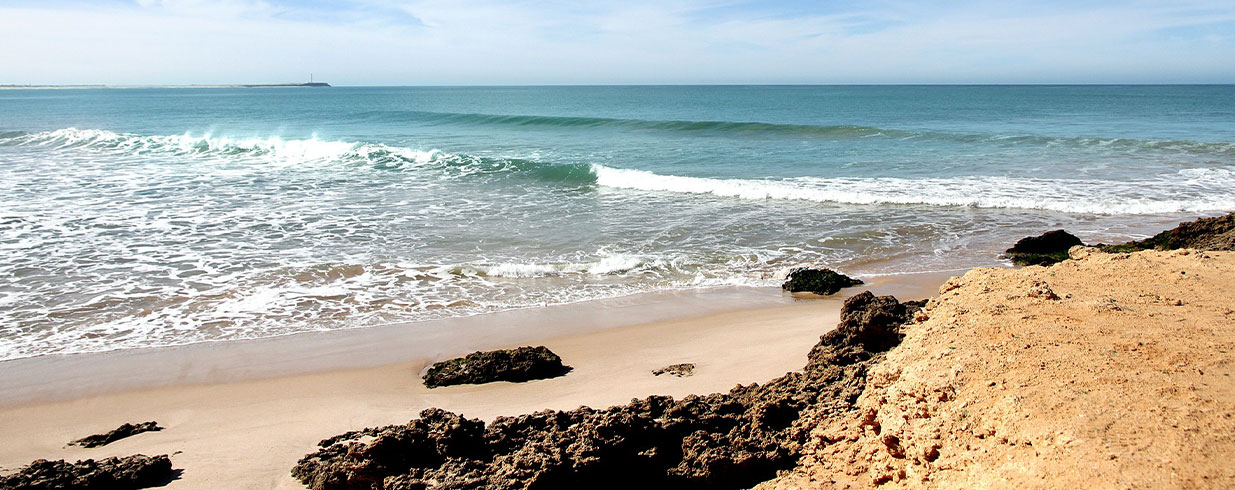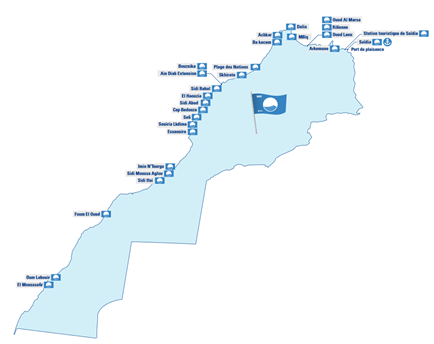A programme aiming to clean beaches, prevent littering, and educate tourists to properly manage their waste.

“Clean Beaches” programme and Blue Flag label for well-managed beaches to prevent littering
OBJECTIVES
The programme has two key objectives:
• Ensure that beaches are clean.
• Raise awareness of beachgoers on the impacts of littering and the importance of proper waste management.
BACKGROUND INFORMATION AND LOCATION
General information on the territory:
• Location: Morocco
• Extent of the project: both Mediterranean and Atlantic coasts
• Population: 36.34 million
• Density: 83.63 person/km2
IMPLEMENTING BODIES
The programme was launched by the Mohammed VI Foundation for Environmental Protection and is implemented via partnership agreements or contracts between local authorities, business partners, NGOs and the Foundation.
KEY STAKEHOLDERS INVOLVED
The programme engages various local actors, including local authorities, businesses and NGOs. Several private companies support the programme, e.g. by sponsoring specific beaches and co-organising activities (e.g. educational programmes, supply of infrastructure and equipment, etc.).
GENERAL CONTEXT
Morocco has about 2,390 km of coasts, and several of its beach resorts are considered as key touristic attractions. Tourism is well-developed and a major activity sector in Morocco, with more than 12 million tourists visiting the country each year.
However, Moroccan beaches are subject to littering, which requires significant clean-up actions. Morocco generates 550,000 tonnes of plastic waste each year, and it is assessed that 55% is leaked into nature, due to uncollected waste, open dumpsites, or residents and tourists littering and improperly handling their waste.
DESCRIPTION OF THE ACTIVITIES
In 1999, the Late King Hassan II called for a mission of protecting the tourist beaches most vulnerable to human activity. The operation “Let’s make our beaches smile” (“Faisons sourire nos plages”) was created, which later became the Clean Beaches program.
The Clean Beaches program aims to improve beach infrastructure and promote clean and safe coasts, by:
• Enhancing the awareness of the various stakeholders.
• Setting up and maintaining basic infrastructures.
• Ensuring safety and sanitation conditions.
• Promoting hygiene and clean beaches.
As coordinator of the program, the Mohammed VI Foundation for Environmental Protection develops and provides to the local actors communication and education tools and materials, defines quality criteria to be followed, and monitors the local actions organised. The Foundation published in 2016 a guide presenting good practices on awareness raising and education. In 2018, a national guide was published focusing on the sustainable management of beaches targeting municipalities, wilayas, and regional authorities. The guide includes practical recommendations and clear targets and standards. A national committee also conducts spontaneous visits to the beaches to monitor the implementation of the activities.
The programme also includes training sessions for local technicians. These sessions also allow the collection of feedback from local players on challenges and needs for effectively reducing marine litter.
Local partnerships are governed by a standardised contract that defines the contributions of the different local stakeholders, including the municipalities, economic partners, local committees, etc. in the implementation of agreed actions. For each beach, a reporting process has to be followed: by the end of the 1st semester of the year, an action plan should be set; then between May and August, a monthly report has to be submitted presenting the progress of the campaign. On 30 September, a final report has to be submitted.
Several actions are organised within the Clean Beaches programme, including:
• Clean-up activities with beachgoers, managed by local cleaning companies, that provide rakes, gloves and bags for people to collect litter.
• Volunteer “beach keepers” who inform and raise the awareness of beachgoers by interacting with them, conducting surveys assessing how clean the beach is, or explaining where waste bins and ashtrays are located.
• Workshops with children where they make recycled paper out of used newspapers.
The Foundation is also the national organiser of the “Blue Flag Label”, an international programme delivering awards to beaches meeting several requirements in terms of cleanliness, water quality, development and management, safety, and awareness/educational activities. For each beach, a local committee is set up and is responsible for the monitoring and evaluation of operations. It always includes a representative from the local authority, municipality, sponsor, civil protection, and other stakeholders.
FINANCING AND COST RECOVERY CONTEXT
The Foundation itself is funded by membership fees and subsidies from various partners: Moroccan and international private companies, Environmental agencies and NGOs, etc. Several Moroccan companies specifically sponsor many beaches by providing equipment or funding educational activities, in partnership with local authorities.
Since 2015, each local partnership contract (focusing on one beach) has to include a three-year strategy, including a list of objectives with corresponding budgets, making the assessment of required resources more accurate.
MAIN ACHIEVEMENTS AND RESULTS
• 102 beaches are covered by the programme
• 27 beaches have been awarded the “Blue Flag” label in 2021
• 1 marina was awarded with the Blue Flag in 2018, that of Saidia Med Resort
KEY FACTORS OF SUCCESS
The collaborative approach bringing local stakeholders together, and the central coordination by the Foundation, ensuring consistency in approaches, methodology and training, can be considered as key factors of success of the programme.
The “Lalla Hassna Trophy” introduced since the beginning of the programme to reward the best-performing beaches has worked as an incentive. It evolved from a single prize to a trophy rewarding beaches that underwent a significant progress in terms of infrastructure, equipment, hygiene, safety, and environmental education. Up to 18 trophies have been awarded in a year.
BOTTLENECKS, LIMITATIONS AND CHALLENGES
In 2017, the programme analysed and identified several shortcomings:
• The insufficient involvement of municipalities.
• Overlaps and lack of clarity in the roles of the various local stakeholders.
• The monitoring process was insufficient to identify problems.
• Inconsistencies between the local activities and topics addressed, causing confusion about the identity of the programme.
This led to the publication and dissemination of a 700-page guide listing and addressing all the challenges faced by local players. These recommendations were based on the contributions and feedback provided by the local technicians in charge of the management of the beaches.
LESSONS LEARNED AND REPLICABILITY
The implementation of local actions is greatly facilitated by the sponsorships provided by private companies and the support of local NGOs. Establishing clear guidelines clarifying the role and responsibilities of each partner as stated in the local partnership contracts, is key in ensuring the proper and smooth implementation of the programme.
REFERENCES, LINKS TO FURTHER INFORMATION
• Plages propres website, accessed on 06/10/2021, https://plagespropres.org/
• Fondation Mohammed VI pour la Protection de l’Environnement (2016), Guide de bonnes pratiques, https://files.plagespropres.org/sites/default/files/publications/pp-guide-animation-fr.pdf
• Fondation Mohammed VI pour la Protection de l’Environnement (2018), Manuel de gestion durable des plages, https://files.plagespropres.org/manuel-gestion-durable-plages.pdf
• Fondation Mohammed VI pour la Protection de l’Environnement (2019), Rapport annuel 2018, https://www.fm6e.org/images/Rapports-annuels-fr/rapportannuel2018-fr.pdf
• Fondation Mohammed VI pour la Protection de l’Environnement (2016), Rapport annuel 2015, https://www.fm6e.org/images/rapports-plages-propres-fr/pp_rapport_2015_fr.pdf
• La Vie Eco (2021), 27 Pavillons Bleus sur les plages du Maroc, accessed on 06/10/2021, https://www.lavieeco.com/actualite-maroc/27-pavillons-bleus-sur-les-plages-du-maroc-pour-lete-2021/
Key information
Topic: clean-up (no-littering), recycling
Waste fraction: plastic waste
Target group: inhabitants, tourists
Instruments: awareness-raising
Date of the implementation
Since 1999

Figure 1: map of the 27 beaches and the marina that received the Blue Flag for summer 2021 (source: Mohammed VI Foundation for Environmental Protection)

